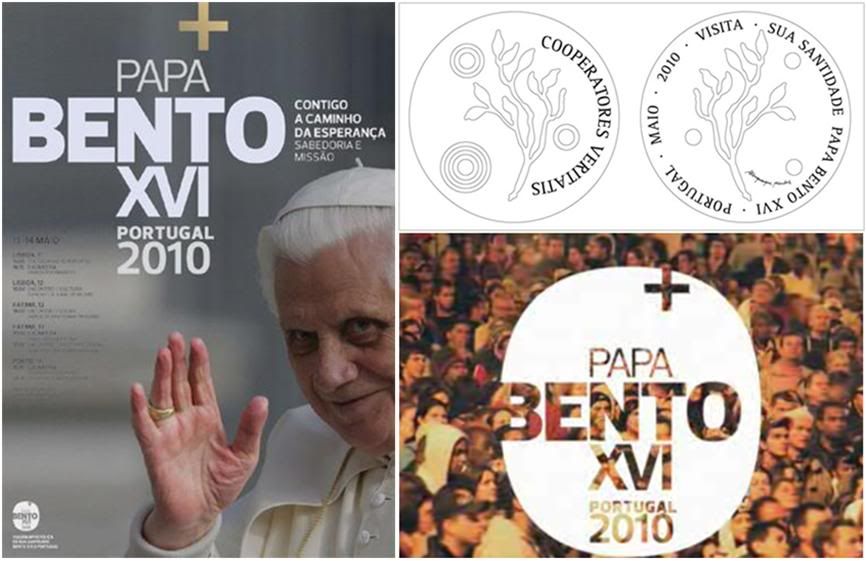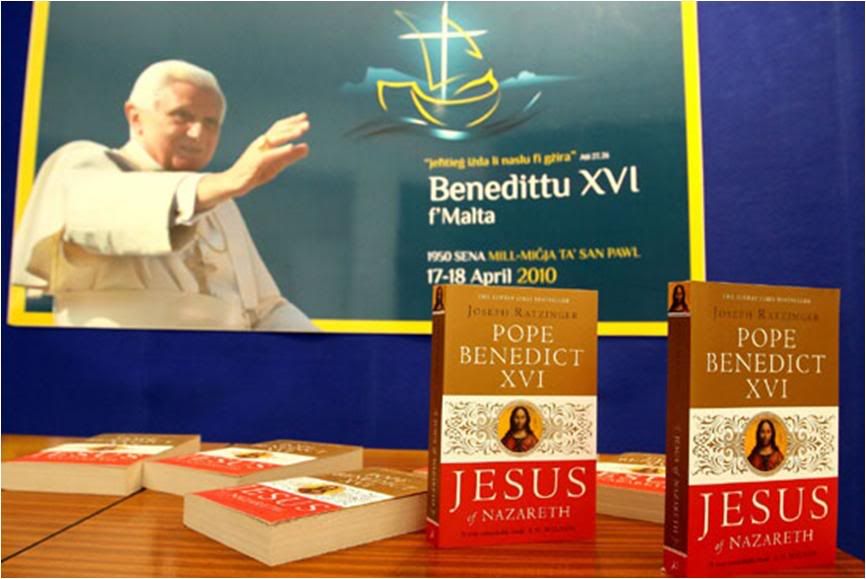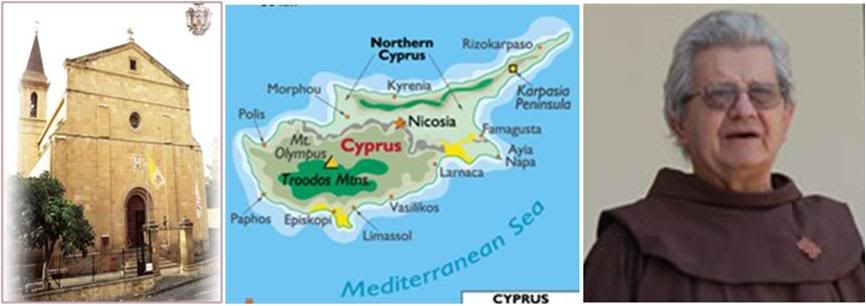
 Walking in hope, wisdom and mission:
Walking in hope, wisdom and mission:
The Pope's apostolic trip to Portugal

February 27 (RV) - The Bishops of Portugal have officially published the theme of Pope Benedict XVI’s upcoming Papal Voyage to the Western European Nation.
The Holy Father will travel to Lisbon, Fatima and Oporto from May 11th to 14th next.
The Bishops have revealed that the theme for the pastoral visit is "With You, We Walk in Hope," with the subtitle, "Christianity, Wisdom and Mission."
Its aim is to confirm Portuguese people in their faith, as the nation prepares to mark the 10th anniversary of the Beatification of the small Shepherd children, to whom the Virgin Mary appeared.
The Pope will be in Portugal both for a pilgrimage and an official visit. He was invited by the Portuguese Episcopal conference and by the Portuguese government. Celebrations and meetings will be held in Lisbon, Fatima and Oporto.
Masses are scheduled to be held in all three cities. In the capital Lisbon, the city's central square and adjacent streets have the capacity to accommodate 150 thousand people, a figure that amounts to 250 thousand in the case of the Avenida dos Aliados, in the city of Oporto.
The bishops also launched a Portuguese language website for the visit.
The Bishops conference noted that the pastoral note it was planning to issue regarding the visit has been postponed until the next meeting of the Permanent Council on March 1.

P.S. Last February 13,
Pope Benedict waived the five-year waiting period to allow the beaitfication process to begin for Sister Lucia dos Santos, the oldest of the three Fatima visionaries, on the third anniversary of her death. I posted a story today in the CHURCH&VATICAN thread, as I was completely unaware of the news. Sorry.
Vatican advance team completes
Portugal reconaissance visit

LISBON, Portugal, FEB. 26, 2010 (Zenit.org).-The Vatican team responsible for organizing security and logistics for Benedict XVI's international trips ended a three-day visit to Portugal on Thursday.
According to the official Website of the papal visit to Portugal, set for May 11-14, a team led by Alberto Gasbarri met at the Apostolic Nunciature in Lisbon with members of the organizing committee of the visit, headed by Auxiliary Bishop Carlos Azevedo of Lisbon.
The Vatican group then held a working session in the Ministry of Foreign Affairs with representatives of the offices of protocol and security.
On Wednesday, the team traveled to Fatima and Oporto, where it met with those in charge locally of the organization and security of the visit.
The master of papal liturgical ceremonies, Monsignor Guido Marini, plans to be in Portugal from March 8-10, to visit the venues where liturgical ceremonies will take place during Benedict XVI's visit.
The prelate will participate in the preparation of the celebrations and will attend some of the rehearsals.
Benedict XVI will celebrate Mass in Lisbon on May 11, and on May 12 will travel to Fatima.
There he will visit the Chapel of the Apparitions and preside at vespers, rosary and procession at the Church of the Most Holy Trinity. On May 13, Benedict XVI will celebrate Mass in Fatima.
Before leaving Portugal, the Pope will visit Oporto and celebrate Mass there on May 14.
 Very little news so far from Malta, which is the first of the Holy Father's trips outside Rome this year:
Very little news so far from Malta, which is the first of the Holy Father's trips outside Rome this year:
 Earlier this week, CNA tried to make the most of a Vatican release of Catholic statistics pretaining to Malta:
Pope likely to draw
Earlier this week, CNA tried to make the most of a Vatican release of Catholic statistics pretaining to Malta:
Pope likely to draw
huge crowds in Malta
Vatican City, Feb 23, 2010 (CNA) - In preparation for Pope Benedict's coming visit to Malta, the Holy See has released some numbers concerning the Church there. The large number of Catholics on the island nation could mean the Pope will see huge crowds.
The Holy Father will be visiting Malta between April 17 and 18 on the occasion of the 1,950th anniversary of the shipwreck of St. Paul.
If the statistics released through Vatican Press Office on Tuesday are any sign, it's likely that the Pope will draw large crowds during his visit.
The Central Office of Statistics of the Church reports that 94.4 percent of the country's 443,000 people are Catholic and that there are 853 religious and diocesan priests in their service.
This, according to the official statistics, means that there is a priest for every 490 Catholics on the island and an average of 10 priests for every place of worship.
In addition to the elevated number of clergy, there are almost 1,150 religious in Malta.
The Church in Malta also has 91 major seminarians, nearly half the number currently studying for the priesthood in Ireland, which has nearly 10 times the population.
Among scheduled events over Pope Benedict's two-day visit are stops at the place traditionally though to have been where St. Paul preached and St. Paul's Grotto in Rabat. The Holy Father will also celebrate Sunday Mass in the Granaries Square of Floriana.
And from the Archdiocese of Malta itself, which does not have a separate site for the papal visit:
 Press briefing on the visit
Press briefing on the visit

On Tuesday, 23rd February, 2010, the Interdiocesan Organising Committee and the National Organising Committee of the Pope’s visit to Malta organised a Press Briefing for Editors of local news agencies.
During this well attended business breakfast, news editors were free to ask questions and mention their suggestions on the media arrangements for the Pope’s visit to Malta.
The Archbishop’s delegate for Social Communications, Fr Charles Tabone O.P, and the Director General of the Department of Information, Mr Martin Bugelli, invited representatives of television, radio and print media to participate in a series of weekly press briefings to be held in the coming weeks as part of the build-up leading to the Pope Benedict XVI’s visit to Malta.
The Press Centre for tHE visit will be located in La Valletta's Excelsior Hotel.
Since this event was held at the Excelsior hotel, News Editors were taken to see the large hall which will host the Press Centre.
Pope Benedict XVI:
His Teachings, his Visit, his Impact?


On Thursday, 18th February 2010, a dialogue event was held at the University Chapel. The event was organised by the University Chaplaincy and commissioned by the Diocesan Youth Commission (KDZ),
Fr John Berry – Visiting Lecturer, Faculty of Theology, Ms Alessandra Dee Crespo as well as Mr David Torpiano, two theology students, outlined the Pope Benedict’s teachings based on his book ‘Jesus of Nazareth’.
Following these presentations, young people took the floor in a question and answer session aimed at instigating deeper reflection on the teachings of Pope Benedict, the significance and impact of his visit next April.
A copy of the book ‘Jesus of Nazareth’ was given to every participant free of charge courtesy of KDZ.
 There's better luck with regard to the Cyprus visit, from one of many sites one has to check from time to time in this respect - the Latin Patriarchate of Jerusalem, the Catholic Church in Cyprus, the Franciscan Custody of the Holy Land and Terrsanta. this interview gives some insight into the particular situation of the Church in Cyprus, a divided nation.
There's better luck with regard to the Cyprus visit, from one of many sites one has to check from time to time in this respect - the Latin Patriarchate of Jerusalem, the Catholic Church in Cyprus, the Franciscan Custody of the Holy Land and Terrsanta. this interview gives some insight into the particular situation of the Church in Cyprus, a divided nation.
 Pope coming to Cyprus:
Pope coming to Cyprus:
What are the preparations?
by GIAMPIERO SANDIONIGI

February 10, 2010
 Left, the Church of the Holy Cross in Nicosia; right, Fr. Barato.
Left, the Church of the Holy Cross in Nicosia; right, Fr. Barato.
At the beginning of June, Benedict XVI will travel to Cyprus, the third largest island in the Mediterranean, for a pastoral journey. He will also give the bishops of the Middle East the
Instrumentum laboris of the Synod due to be held next October in the Vatican.
A small Catholic community, made up of lay people and religious of the Maronite and Latin rites, lives on the island. The Latins come under the pastoral responsibility of the Latin Patriarch of Jerusalem and for centuries have been assisted by the friars minor of the Custody of the Holy Land.
Prior to the Pope's visit, we asked Father Umberto Barato, parish priest in Nicosia and Vicar General for Cyprus of the Latin Patriarchate, a few questions about the trip.
Father Barato, the Pope receives invitations from many governments and episcopates but cannot accept them all. How do you explain his decision to come to Cyprus, an island with, after all, a fairly small Catholic community?
I don't know how many invitations the Pope receives and from how many countries. I only know that he decided to accept the invitation of the Orthodox Archbishop of Cyprus, Chrysostomos II, and the President Dimitri Christofias.
There had been a precedent and perhaps that also counted: John Paul II had wanted to visit the island but, due to questions of time and the Pope's poor health, he never made the journey.
It is true that the Catholic community in Cyprus is small, but I do not think that this is a contra-indication. However that may be, I believe that Benedict XVI decided to make the visit prior to the Synod on the Middle East. In addition, he will also have thought about the political and religious situation of the island.
It's not that the Pope can solve the problem of the division of Cyprus or tell the leaders what they should do, but his presence can give courage and a positive impulse to relations between the two sides.
When the trip was announced, some people imagined that it would have particular consequences on ecumenical dialogue at a European, or even global, level. What do you think about this? What are the daily relations between Catholics and Orthodox like in Cyprus, and with the Turkish Muslim minority?
It's natural that people think like that. Going to a country with an Orthodox majority, it is obvious that some people think that the meeting between the Pope and the leaders of the local Church can be ecumenical in character, that it is like a step ahead in the encounter, understanding and reciprocal acceptance.
I expect that after the visit, relations between the Catholic and Orthodox Churches in Cyprus will become even closer. They are already excellent and at a level that I do not believe can be found elsewhere in parts of the world where the two Churches coexist. I'll pass over the minor difficulties that sometimes we come up against. In general, these are the fruit of ignorance or prejudice fuelled by the long separation and reciprocal non-recognition between the two sides.
The positive fact is that the Catholic Church in Cyprus is accepted, recognized and esteemed for its work of apostolate and education. There are already some forms of collaboration, but the Pope's visit will certainly be a privileged occasion for the bonds to become even closer. With the Muslims, on the contrary, we have no relations.
The months leading up to June will undoubtedly be a period of intense preparation for you. How are you proceeding? What is most important for you?
Time is passing quickly. We have set up a central committee of management and coordination. Its chairman is Mons. Ioussif Soueif, the archbishop of the Maronites of Cyprus and I am the deputy chairman. The committee coordinates about ten commissions - made up of priests, religious and lay volunteers - who will take on the various organizational aspects.
We had a meeting on 14th January, open to all the Maronite and Latin faithful, which was attended by about 250 people. After general information given by Mons. Soueif, many of those present chose the commission they wanted to join. On Saturday 30th January we called all the coordinators together to give them further details on the duties of the commissions. Now each coordinator has to convene their commission and begin work.
Monsignor Soueif places great emphasis on spiritual preparation for the Pope's visit. We hope that it is not just an extraordinary social occasion, with a few solemn moments of prayer. It is our intention to prepare our parishes with instruction, preaching and prayer.
I see the need to give our faithful precise information on the figure of the Pope in the Catholic Church, the theological implications of his ministry and also the difference that there exists between our Church and the Orthodox Church regarding his role. We have given a prayer for the Pope to all our faithful, which is said in English or in Greek at the end of every Mass.
The programme of the Pope's journey is still being worked on. Perhaps, however, we can already answer one question: will Benedict XVI also cross into the northern part of the island, occupied by Turkish troops?
So far nothing has been said about this and I don't think anything will be said later on either.
Have you been able to collect any impressions and expectations on the visit from outside the Catholic community in Cyprus?
I think that very few Orthodox know about the visit as yet. Almost every day I meet people who still have not heard the news. When I say that the Pope will really be coming, they seem pleased. I think that when the date of the trip draws nearer, the papers and TV will wake up as well. And then... it'll be every man for himself!
The Latin community is made up essentially of simple people, who have come to Cyprus from poorer countries in search of work. How will they come into contact with the Pope? What were their feelings when they heard the news that he was coming?
There is enthusiasm and joy amongst our faithful. They feel privileged, in a certain sense, because it is a unique opportunity. I think that as the preparation continues, their enthusiasm will be even more visible.
The foreign workers and various refugees will come into contact with the Pope in particular on 6th June, when he will celebrate the solemn Eucharist in the stadium and everybody will be able to see him, even though from afar.
As usual, Benedict XVI will stay in the nunciature and in Nicosia, the nunciature occupies a wing of the Franciscan convent. The Custody of the Holy Land has taken this opportunity to do some renovation and you, the friars, for the time being, have been "evicted". What sort of work is being done, when did it start and when will it finish?
We have taken this occasion to renovate a house built at the end of the 1950s and nothing had ever seriously been done to modernize it. It needed some work, especially replacing the whole of the electrical wiring which, according to the experts, was dangerous. Work began on 4th January and should be finished on 15th April.
Work is intense and the first results can already be seen. In the end we will have a more modern and efficient convent which better suits the needs of life today. At the same time, though, it will not lose the simplicity of a Franciscan place. Quod est in votis...
The surroundings of the convent/nunciature are rather a sorry sight and still show the scars left by the civil conflict in the 1960s and 70s. Do you think that the authorities will take the occasion of the Pope's visit to develop the area?
I can't answer this question. To date I haven't heard anything about work by the local authorities on the buildings standing around the Church and the convent. I think that it will be difficult for them to intervene or they will be able to intervene in some way with the permission of the UN
[which administers the buffer zone between the Greek part and the Turkish part of Nicosia].
It's the Turks who have to think about the scars and the ruins on the other side, if they think about them at all! But wouldn't it be better for the Pope to see the division and ruins that still exist 35 years after the Turkish invasion with his own eyes?
[Modificato da TERESA BENEDETTA 28/02/2010 12:24]